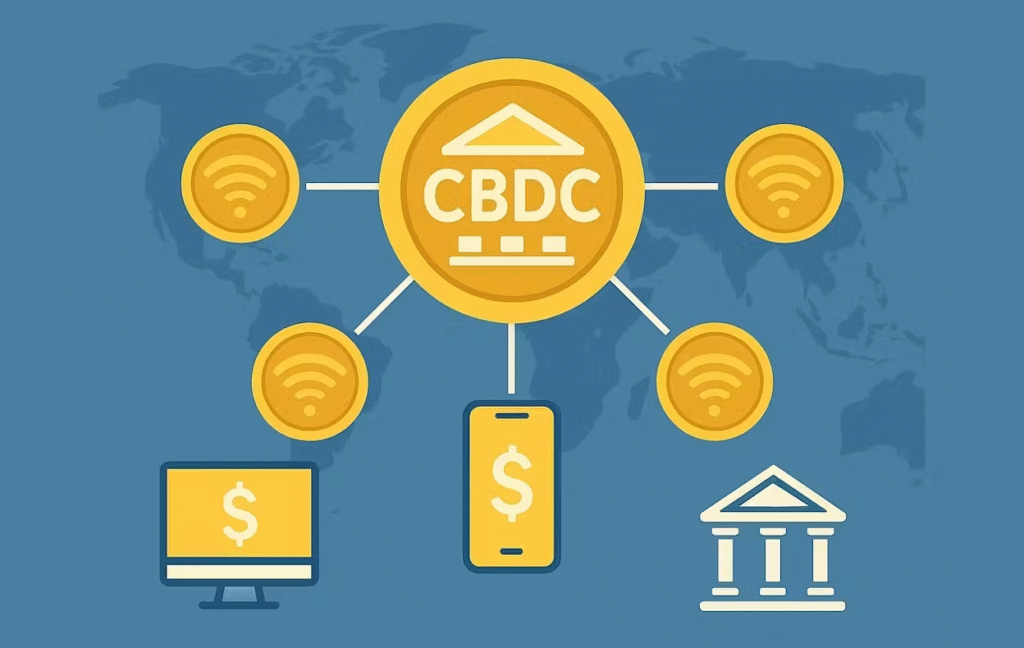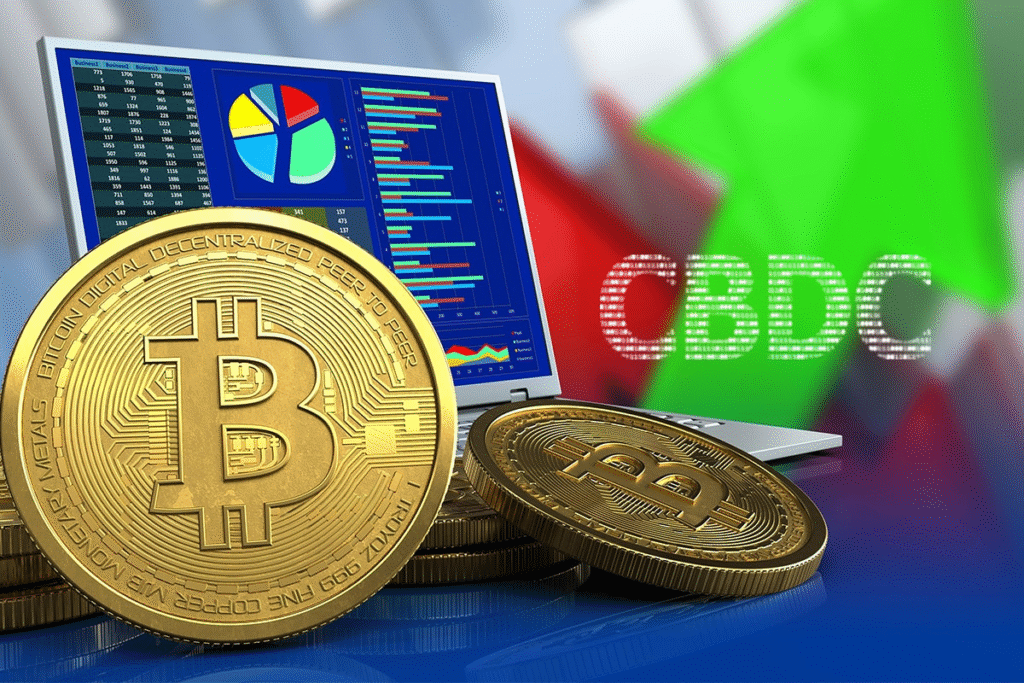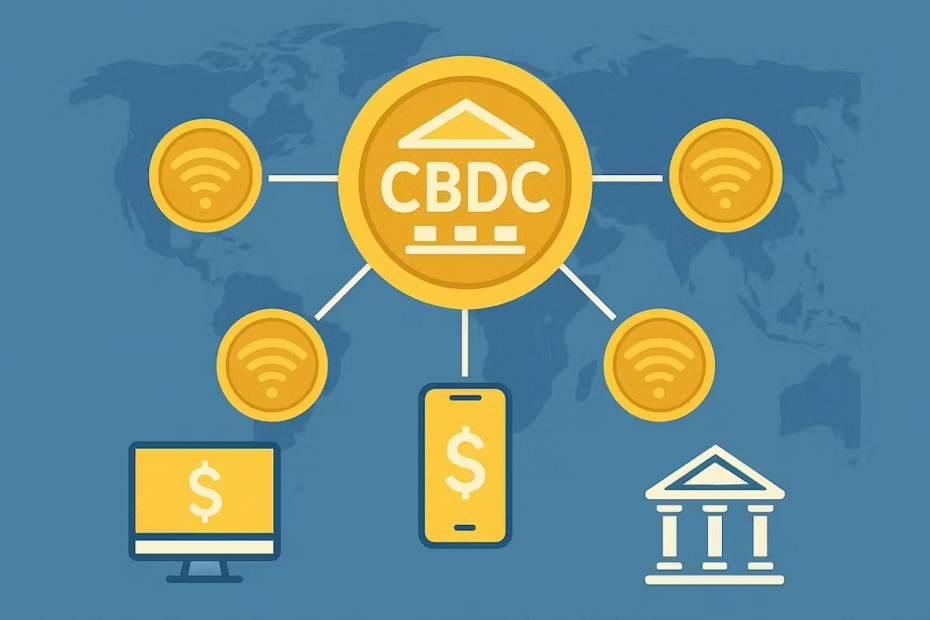Money is going digital, and fast. But it’s not just about using your phone to pay for coffee anymore.
There’s a big shift happening — and it’s being driven by two very different ideas of what digital money should look like:
👉 CBDCs (Central Bank Digital Currencies)
👉 Cryptocurrencies (like Bitcoin and Ethereum)
This isn’t just a tech race. It’s a battle between control and freedom, centralization and decentralization. And what wins could seriously shape how you save, spend, and protect your money in the future.
Let’s break it all down.
What Exactly Are CBDCs?
CBDCs are digital versions of a country’s regular currency. Think of them as digital dollars, rupees, or euros, created and managed by central banks.
So instead of printing more paper money, governments just hit a digital “mint” button.
Why do they matter?
- They’re fully controlled by governments.
- Every transaction is traceable.
- You’ll likely use them for things like tax refunds, aid payments, or everyday spending.
Example:
China has already rolled out the Digital Yuan, a CBDC people use through apps — but the government can monitor every transaction.
What Makes Cryptocurrencies Different?
Crypto is the rebel in the room.
Coins like Bitcoin or Ethereum run on blockchain technology, and no single person, company, or government controls them.
Why people love crypto:
- You own your money — no middleman.
- It’s borderless — send it anywhere.
- Some cryptos, like Bitcoin, have a fixed supply, so inflation is limited.
- It offers privacy, especially with coins like Monero or Zcash.
Example:
In places where the national currency keeps crashing (like Venezuela), people use Bitcoin as a safer alternative to save their money.
Quick Comparison: CBDCs vs. Crypto
| Feature | CBDCs | Crypto |
| Who’s in charge | Central Banks | No one (decentralized) |
| Privacy | Very limited | Varies by coin (can be private) |
| Supply | Unlimited (controlled by government) | Often fixed (like Bitcoin) |
| Speed & Cost | Fast and low-cost | Fast, but network fees vary |
| Purpose | Government-backed payments | Financial freedom and privacy |
Why Governments Are Pushing CBDCs
Central banks want to keep up with the times. They see digital currencies as a way to:
- Modernize payments
- Track illegal activity
- Send money faster during emergencies
- Regain control from crypto’s wild west
With a CBDC, your government could send you tax refunds instantly or put spending limits on aid money — all with a click.
Sounds helpful, right?
But here’s the trade-off: less privacy and more control.
What Crypto Offers That CBDCs Don’t

Crypto is about freedom and ownership. It was built as a response to the 2008 financial crash — a way to escape big bank control.
With crypto:
- No one can freeze your funds.
- You can send or receive money from anywhere.
- It’s permissionless — no ID or bank account required.
But it’s not perfect. Crypto is still volatile, and scams are common. Plus, without regulation, users are on their own if things go wrong.
Why the Battle Really Matters: It’s About Control
This isn’t just about coins or tokens. It’s about who holds the power over your money.
CBDCs mean:
- Governments stay in control.
- Every transaction is traceable.
- Emergency tools for the economy are easier to use.
Crypto means:
- You control your money.
- It’s much harder for anyone to censor or monitor you.
- You trade privacy for responsibility.
In short: CBDCs offer convenience. Crypto offers independence.
Will One Replace the Other?
Probably not.
They’re more like tools for different goals than direct rivals.
You might use CBDCs for your daily shopping or tax returns.
You might use crypto for saving long-term, investing, or sending money abroad without huge fees.
In the future, your phone could hold both — and you get to choose which to use.
Final Thoughts: What You Should Take Away
The rise of digital currencies isn’t just hype — it’s happening right now.
As countries develop CBDCs and crypto continues to grow, the way we deal with money is shifting fast.
So, here’s the big question:
Do you want convenience with control, or freedom with risk?
This battle between CBDCs vs. Crypto is really about who gets to decide what happens to your money.
And the best part? You’ll probably have the power to choose.
TL;DR — Key Takeaways:
- CBDCs are digital versions of national money, managed by governments.
- Crypto is decentralized, giving people full control and privacy.
- CBDCs offer convenience and control, while crypto offers freedom and privacy.
- They won’t replace each other — you’ll likely use both.
- The real shift? You’ll have more financial choice than ever.
Frequently Asked Questions (FAQ)–CBDCs vs. Crypto

1. What’s the main difference between CBDCs and cryptocurrencies?
CBDCs are digital versions of national currencies created and controlled by central banks.
Cryptocurrencies (like Bitcoin or Ethereum) are decentralized and not controlled by any government or authority.
2. Are CBDCs the same as digital wallets or UPI apps?
Not quite.
UPI apps like Google Pay or PhonePe move your money digitally, but that money still sits in a regular bank account.
CBDCs are actual digital money issued directly by a central bank — there’s no bank middleman.
3. Will CBDCs replace cryptocurrencies like Bitcoin?
No.
CBDCs and cryptocurrencies serve different purposes.
CBDCs are for regulated, official payments.
Crypto focuses on freedom, privacy, and decentralized finance (DeFi).
4. Are CBDCs safe to use?
Yes, because they’re backed by central banks.
But they also come with less privacy, since every transaction can be tracked.
5. Why do governments want to create CBDCs?
CBDCs help:
- Modernize financial systems
- Deliver aid or benefits faster
- Keep up with crypto innovation
- Prevent illegal money flows
- Maintain control over monetary policy
6. Can I use both CBDCs and cryptocurrencies?
Absolutely.
In the future, you might keep CBDCs for everyday spending and use crypto to save, invest, or shop globally.
7. Which is more private: CBDCs or crypto?
Crypto is more private, especially coins like Monero or Zcash.
CBDCs will likely be fully traceable by government authorities.
8. Do I need the internet to use CBDCs or crypto?
Yes — both are digital.
However, some countries (like China) are testing offline payment features for CBDCs to help in areas with poor connectivity.
9. What’s the risk of using cryptocurrency?
- Prices can be very volatile
- Scams and fraud are common
- No customer service or recovery if you lose access to your wallet
- Governments may regulate or restrict usage in the future
10. How do I choose which one to use?
It depends on what you need:
| Goal | Better Option |
| Fast, official payments | CBDCs |
| Full control over your money | Crypto |
| Privacy-focused transfers | Crypto |
| Government-backed reliability | CBDCs |
